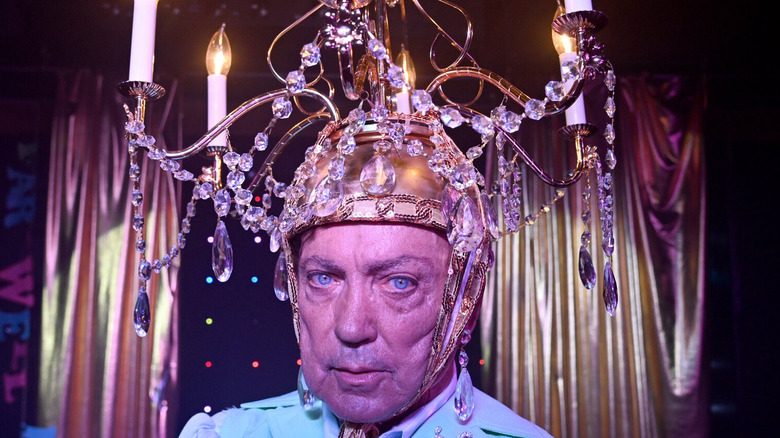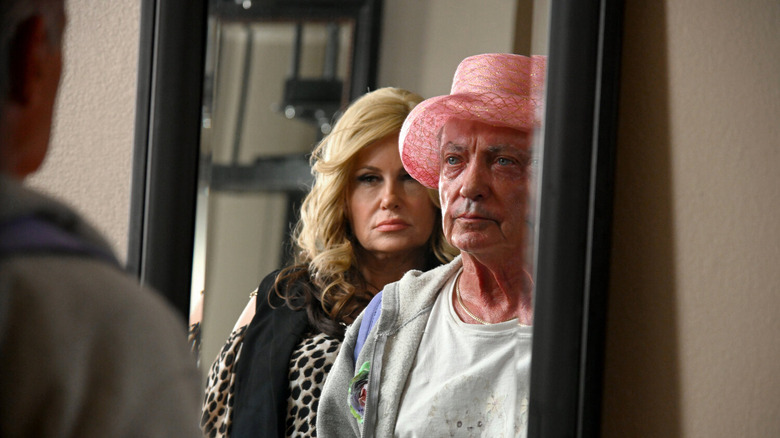Swan Song Review: A Glamorous Showcase
After decades of having his distinct voice and unforgettable visage pop up in a wide variety of genre pictures, beloved character actor Udo Kier hogs the spotlight in Todd Stephens' new film "Swan Song." Usually leveraging his piercing eyes and otherworldly presence as some kind of vampire, ghoul, or otherwise haunting figure, it's a pleasant change of pace to see Kier play Pat Pitsenberger, a once-renowned hair stylist on a rueful mission to do one last favor for an old client.
The film is first and foremost a tribute to the real-life Pitsenberger, a Sandusky, Ohio hairdresser who made a profound impact on Stephens in his youth, as well as an opportunity for the director to film and showcase his hometown. But in penning this love letter to the unsung forebearers of the queer community, those who lived their truth openly at times when it even harder to do so, Stephens has provided space for Kier to show off considerable strength that his many supporting turns have rarely displayed so effectively.
"Swan Song" proves to be one of those smart little indies that overcomes its diminutive stature and budget off the back of its charm, heart and swagger. It's the sort of film one hopes to see at a film festival and not some of the meandering dreck that inevitably clogs up the arthouse space with astonishing regularity.
Return of the mack
"Swan Song" begins with the threadbare set-up one might expect from a '70s crime thriller, only instead of a former gangster getting out of jail to rain down vengeance on some unsuspecting hood, it's an old queen breaking out of a retirement home for One Last Job.
Pat Pitsenberger (Kier) gets a visit from a lawyer representing his former client Rita (Linda Evans), informing him that not only has Rita passed, but that in her will, she specified that she wanted Pat to do her hair one last time, for the funeral. It's clear the two of them had a tumultuous falling out sometime before her death and Pat's fall from grace, but this mission, initially a request he turns down, becomes the focal point of his twilight days. Getting back to town, gathering the right beauty products, and honoring his deceased friend becomes less about the task itself and more about what the undertaking represents.
The quest is littered with uneasy recollections of past trauma, of Pat wrestling with regrets and loss — not just related to Rita, but also his lover David who passed years ago. Bittersweet ruminating on the nature of aging and the restorative power of friendship aside, "Swan Song" is no dirge. Stephens has a shrewd sense of humor and a gentle touch as a storyteller, so as much pathos as he's able to wring from Pat's journey, he also puts our flamboyant protagonist in plenty of situations designed to provide the necessary amount of levity to keep this heavy narrative light and buoyant.
There's something so strange and heartwarming about this peculiar tale that makes it come off a little like a camp version of Don Coscarelli's "Bubba Ho-Tep," but the film is less cartoonish and more rooted in vèritè. Obviously, it's Stephens' authorial voice and sense of humor that gives the film its life, but it's Kier's unmissable central performance that sets "Swan Song" apart.
His delivery of the film's many laugh lines will be endlessly memeable when this film hits VOD and viewers can take high resolution screengrabs of the faces he makes when he curiously deadpans gems like "How can someone so flawless be on Social Security?" Watching him try to procure outdated hair care products like Vivante, or insisting on smoking a brand like Mores, regularly elicits humorous responses from the townspeople he encounters, but it furthers his standing as a larger-than-life outsider who is remarkably out of lockstep with time.
Despite so many elements of queer culture being made mainstream, Pat remains a relic of a different era, and while the film has its share of laughs at the anachronistic nature of his persona, it never laughs at him. It's always with him and his observations at the world changing around him.
It gets better
The understated character study side of "Swan Song" is all about Pat unpacking the grudges he's carried through life, primarily surrounding two principle betrayals. The more overt feud comes with him encountering his former protege Dee Dee (Jennifer Coolidge), who opened her own salon across the street from his and has become a staple herself within the community, and the more mysterious animosity he holds towards Rita, whose posthumous coiffure he has set out to sculpt.
At first, it seems as simple as Pat hating Dee Dee for stealing his thunder and replacing him, as well as refusing to forgive Rita for being the one to do the replacing. But in fact, each of his respective strands of unprocessed anger are tethered in a daisy chain all expressing the same knotty ball of hurt.
"Swan Song" posits that, for those living on the margins, whose culture and lifestyle are so equally denigrated by bigotry and cannibalized by exploitative forces inextricably tied to that same bigotry, camaraderie is the highest currency. And it's the three central losses of that companionship that characterize the sadness shaping the edges of Pat's erstwhile regality.
Sure, the movie engages on broader terms with the portrait of Pat as a queer elder statesman mystified by Grindr, utterly confounded by the impending tsunami of rainbow capitalism threatening to wash away the lasting vestiges of authenticity in this area and casually contemptuous of the patronizing way supporting characters highlight the boon of shifting social mores.
(Of all Kier's killer line readings, few resonate more than the eye roll that accompanies him saying "oh, great" to a friend all too proudly remarking on an injustice from Pat's past that she claims would never happen now, as if the present day, snail's pace progress somehow negates the very real pain inflicted upon him in years past.)
But Pat's beef with Dee Dee isn't about her becoming his competition, but her ceasing to be his comrade, the loss of someone he considered close, even if he wasn't always grateful for her presence. It's wrapped up in his feud with Rita that wasn't centered on her switching hair stylists, like the film seems to initially suggest, but in her refusal to engage with the loss of Pat's lover David, a slap in the face that leaves a man who considered this affluent, Republican crone one of his closest confidantes forced to accept that he was little more than the hired help.
It's a heartbreaking revelation, but one whose mournful reckoning is matched, if not exceeded, by the devastating way Stephens finds to provide Pat with some catharsis about one of the most important relationships in his life. It doesn't come in the (admittedly very moving) scene when Pat comes face to face with his deceased friend's body as it comes to life for one final verbal dust-up. Rather, it comes in a touching confessional from Rita's young relative Dustin (Michael Urie).
The scene, perhaps the most literal manifestation of Stephen's desire to tell the real life Pitsenberger how important a figure he was, indirectly harbors a passing aside that's unlikely to leave many dry ears in its wake.
"Swan Song," not unlike the Robyn song that scores one of its most raucous sequences, is a loving celebration of life that finds it richest textures in smiling through the pain, in highlighting the beauty in the world's many tragedies. It's also the film Kier has deserved to star in for quite some time.


